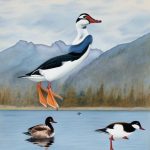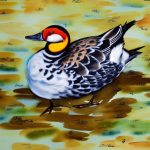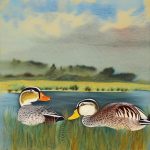Ducks have been an integral part of Canadian agriculture for centuries, providing both meat and eggs for consumption. There are numerous duck breeds that are raised in Canada, each with its own unique characteristics and purposes. From heritage breeds that have been around for generations to commercial breeds that are specifically bred for meat or egg production, Canadian duck breeders have a wide variety of options to choose from. In this article, we will explore the popular duck breeds in Canada, the conservation efforts being made to preserve these breeds, and the considerations for raising ducks in the Canadian climate.
Table of Contents
Key Takeaways
- There are a variety of duck breeds in Canada, each with unique characteristics and purposes.
- Popular duck breeds in Canada include the Pekin, Khaki Campbell, and Rouen.
- Heritage duck breeds in Canada, such as the Silver Appleyard and Saxony, are valued for their historical significance and conservation efforts.
- Commercial duck breeds in Canada, like the White Pekin, are bred for their meat and egg production.
- Conservation efforts are important for preserving rare and endangered duck breeds in Canada.
Popular Duck Breeds in Canada
One of the most popular duck breeds in Canada is the Pekin duck. Known for its large size and white feathers, the Pekin duck is primarily raised for meat production. They are fast-growing and have a high feed conversion ratio, making them an efficient choice for commercial duck farming. Another popular breed is the Khaki Campbell, which is prized for its high egg production. Khaki Campbells are known to lay upwards of 300 eggs per year, making them a favorite among small-scale duck farmers and homesteaders. The Muscovy duck is also a common sight on Canadian farms, known for its lean and flavorful meat. Muscovy ducks are excellent foragers and are often raised in free-range systems. Other popular duck breeds in Canada include the Rouen, Cayuga, and Indian Runner, each with its own unique characteristics and purposes.
On the other hand, the Saxony duck is a relatively new breed in Canada but has been gaining popularity for its dual-purpose nature. Saxony ducks are known for their excellent meat quality as well as their ability to lay a respectable number of eggs. They are also known for their calm and friendly temperament, making them a great choice for small-scale farmers and backyard enthusiasts. The Crested duck is another popular breed known for its distinctive crest of feathers on its head. While they are not as prolific egg layers as some other breeds, Crested ducks are valued for their ornamental appearance and gentle disposition. Lastly, the Welsh Harlequin is a breed that has gained popularity in recent years due to its excellent egg-laying abilities and calm temperament. With their beautiful silver and gold plumage, Welsh Harlequins are not only productive but also aesthetically pleasing additions to any farm or homestead.
Heritage Duck Breeds in Canada
Heritage duck breeds are those that have been around for generations and are often raised for their unique characteristics and historical significance. In Canada, heritage duck breeds such as the Cayuga, Rouen, and Indian Runner have been cherished for their contributions to traditional farming practices. The Cayuga duck, with its iridescent green-black plumage, is a beautiful and hardy breed that has been raised in North America since the mid-19th century. Known for their calm temperament and excellent foraging abilities, Cayuga ducks are valued for both meat and egg production. The Rouen duck is another heritage breed that has been raised in Canada for centuries. With its striking resemblance to the wild Mallard, the Rouen duck is prized for its flavorful meat and ability to thrive in various climates.
The Indian Runner duck is a unique heritage breed known for its upright stance and distinctive egg-laying abilities. Indian Runners have been raised in Canada since the early 20th century and are valued for their high egg production and efficient foraging habits. These heritage duck breeds play an important role in preserving genetic diversity within the Canadian duck population and are often favored by small-scale farmers and conservationists who seek to maintain traditional farming practices.
Commercial Duck Breeds in Canada
In addition to heritage breeds, there are several commercial duck breeds that are specifically bred for meat or egg production in Canada. The Pekin duck is one of the most widely raised commercial breeds in the country, known for its rapid growth and efficient feed conversion. Pekin ducks are favored by large-scale commercial operations due to their high meat yield and adaptability to intensive farming systems. Another popular commercial breed is the White Layer duck, which is bred specifically for high egg production. White Layer ducks are known to lay large white eggs and are often raised in large-scale egg production facilities.
The Moulard duck is a hybrid breed that is commonly raised for foie gras production in Canada. Moulards are a cross between a Muscovy drake and a Pekin hen, resulting in a duck with excellent meat quality and a high fat content that is prized for foie gras production. While controversial, foie gras production remains a niche industry in Canada, with Moulard ducks being raised under specific conditions to produce this luxury food product.
Conservation of Duck Breeds in Canada
Conservation efforts are underway in Canada to preserve and protect rare and endangered duck breeds. Organizations such as Rare Breeds Canada and Ducks Unlimited Canada work to promote the conservation of heritage duck breeds and their genetic diversity. These organizations provide resources and support to breeders who are dedicated to preserving rare duck breeds through responsible breeding practices and education.
One example of a rare breed conservation success story is the Silver Appleyard duck, which was on the brink of extinction before dedicated breeders worked to revive the breed in Canada. Through careful breeding and conservation efforts, the Silver Appleyard duck has made a comeback and is now recognized as a valuable heritage breed with excellent meat and egg production qualities.
Considerations for Raising Ducks in Canada

When raising ducks in Canada, there are several important considerations to keep in mind. First and foremost, it’s essential to provide ducks with adequate shelter from the harsh Canadian climate, especially during the winter months. Proper housing with insulation and ventilation is crucial to ensure the health and well-being of ducks in colder regions.
Additionally, access to clean water is essential for ducks, as they require water for drinking, bathing, and preening. In colder climates, it’s important to ensure that water sources do not freeze over, which may require heated waterers or regular maintenance to prevent ice buildup.
Feeding ducks a balanced diet that meets their nutritional needs is also crucial for their health and productivity. Ducks require a diet that includes protein, vitamins, minerals, and carbohydrates to support their growth, egg production, and overall well-being.
Finally, predator control is an important consideration when raising ducks in Canada. Predators such as foxes, raccoons, and birds of prey pose a threat to ducks, especially when they are allowed to free-range. Implementing predator-proof fencing, secure housing, and vigilant monitoring can help protect ducks from potential threats.
Conclusion and Resources for Duck Breeders in Canada
In conclusion, Canadian duck breeders have a wide variety of breeds to choose from, each with its own unique characteristics and purposes. From popular commercial breeds like the Pekin duck to heritage breeds like the Cayuga and Indian Runner, there are options available for both small-scale farmers and large-scale commercial operations.
For those interested in raising ducks in Canada, there are resources available through organizations such as Rare Breeds Canada and Ducks Unlimited Canada that provide support for conservation efforts and responsible breeding practices. Additionally, connecting with local breeders and joining online forums or social media groups can provide valuable insights and support for new and experienced duck breeders alike.
Overall, raising ducks in Canada can be a rewarding endeavor, providing opportunities to contribute to conservation efforts while enjoying the benefits of meat and egg production from these versatile birds. With careful consideration of housing, nutrition, predator control, and conservation efforts, Canadian duck breeders can contribute to the preservation of diverse duck breeds while reaping the rewards of sustainable farming practices.
If you’re interested in learning more about poultry breeding, you might also want to check out this informative article on mating season for turkeys. It provides valuable insights into the breeding process and can be a great resource for anyone looking to expand their knowledge of poultry farming.
FAQs
What are the most common duck breeds in Canada?
The most common duck breeds in Canada include the Pekin, Mallard, Rouen, and Khaki Campbell.
What are the characteristics of Pekin ducks?
Pekin ducks are known for their white feathers, orange bills, and calm temperament. They are a popular choice for meat production and are also commonly kept as pets.
What are the characteristics of Mallard ducks?
Mallard ducks are known for their colorful plumage, with the males having a distinctive green head. They are a wild species of duck and are commonly found in wetlands and waterways across Canada.
What are the characteristics of Rouen ducks?
Rouen ducks are similar in appearance to Mallards, but they are larger and heavier. They have a calm and friendly disposition, making them popular for both meat production and as pets.
What are the characteristics of Khaki Campbell ducks?
Khaki Campbell ducks are known for their khaki-colored feathers and their prolific egg-laying abilities. They are a popular choice for backyard egg production and are known for being good foragers.
Meet Walter, the feathered-friend fanatic of Florida! Nestled in the sunshine state, Walter struts through life with his feathered companions, clucking his way to happiness. With a coop that’s fancier than a five-star hotel, he’s the Don Juan of the chicken world. When he’s not teaching his hens to do the cha-cha, you’ll find him in a heated debate with his prized rooster, Sir Clucks-a-Lot. Walter’s poultry passion is no yolk; he’s the sunny-side-up guy you never knew you needed in your flock of friends!







